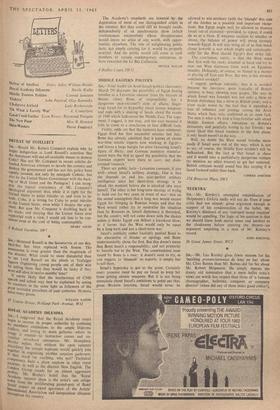MIDDLE EASTERN POLITICS
SIR,—Your leader on Arab-Israeli politics (Spectator. March 29) discounts the possibility of Egypt having missiles as a Levantine rumour from the bazaars of Beirut; clears Bonn of responsibility for a dangerous (non-exi-,tent?) state of affairs; finger- wags Israel for its hypocrisy about atomic weapons; and ends with a shaking of heads about the events of 1948 which balkanised the Middle East. The argu- ment, I suggest, is too easy, and too easy because it fails to come to a conclusion or face difficult facts.
Firstly, odds arc that the rumours have substance. Egypt fired her first successful missiles last July; Bonn has already admitted that it knows of eleven war-time missile experts now working in Egypt— and leaves a large margin for error favouring Israel's figure of thirty; and German munition manufac- turers were the first to spoof the possibility that the German experts were there to carry out disin- terested 'research.'
There are public facts—Levantine rumours, if you wish—about Israel's military strategy. One is that she depends on and has near-perfect military intelligence since her short-term strategy is to attack the moment before she is attacked (she says) herself. The other is her long-term strategy of trying to hold out for two years in event of war—this on the sound assumption that a long war would excuse Egypt for bringing in Russian troops and that the West would rather try to neutralise the situation than let Russians in. Israeli diplomacy is theatrical, but the country will not come down with the shakes unless it thinks Egypt can deliver a knockout blow, as it knows that the West would only be upset by a long-term and not a short-term war. Israel's publicity rather foolishly pushed Bonn to the alternative of bluster or apology and Bonn understandably chose the first. But this doesn't mean that Bonn hasn't a responsibility, and not primarily to Israelis but to the West. The constitutional issue raised by Bonn is a ruse: it doesn't need to try, as you suggest, to 'dissuade' its experts; it simply has to tell them.
Israel's hypocrisy is not to the point. Certainly every pressure must be put on Israel to keep her from getting atomic weapons. But it is not being unrealistic about Israel's ambitions to point out that, given Western interests, Israel would never be allowed to win territory (with the 'triangle' this side of the Jordan as a possible and important excep- tion). But Egypt might well be allowed to trounce Israel out of existence—provided, to repeat, it could do so at a blow. If weapons escalate to missiles or above, the balance of. power will swing strongly towards Egypt. It will also bring all of us that much closer towards a war which might end catastrophi- cally for the West should Egypt's first strike fail.
The conclusion, surely, is that the West must deal first with the read, mischief at hand and try to ease out West Germans from work on Egyptian missiles. Delicately, of course, as Nasser is a master at playing off East and West. But why is this obvious conclusion avoided?
I suggest, perhaps unkindly, that it is avoided because the Spectator, quite typically of British opinion, is busy chewing sour grapes. The way in which Israel was founded was not only a blow to British diplomacy but a blow to British pride; and a blow made worse by the fact that it signalled a loss of influence and prestige among the Arab States which Suez only confirmed as an open fact, The sum is what is by now a long-familiar sulk about Middle Eastern affairs, ridiculous to Britain's detractors, and painfully boring to her friends: we never liked this Israel business in the first place; if only Israel weren't in the way....
Well, no doubt the West would breathe more easily if Israel were out of the way; which is not to say, of course, the Middle East wouldn't still be balkanised. But the fact is that Israel is there and it would take a particularly dangerous venture (to mention no other reason) to get her removed. British criticism would sound less like carping if it faced forward rather than back.
CONRAD JAMESON


































 Previous page
Previous page